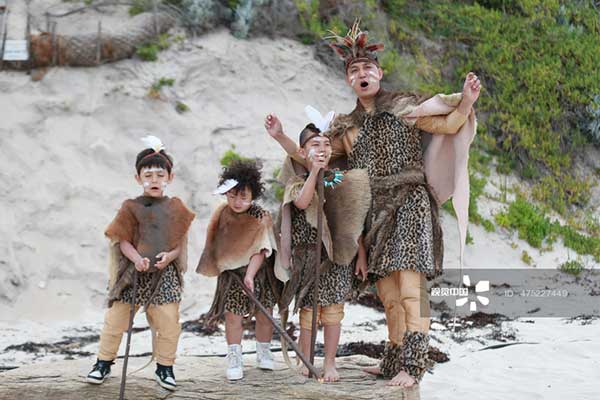 |
|
Children and host Li Rui dress as cavemen during the third season of the reality TV show Dad, Where Are We Going? in October.[Photo provided to China Daily] |
Potential pitfalls
Despite overseeing the publicity campaign for the movie, Zheng now has deep concerns about the format's validity and the potentially adverse effect on the children involved: "Although it sounds a promising and easy track for people in the entertainment industry, making a profit from reality shows involving kids is not sustainable. It's also somewhat inappropriate. Reality shows such as these do more harm than good to the kids involved."
Liao Baoping, a columnist with the Yangtze River Daily, said the growing popularity of shows featuring celebrities and their children may have been the catalyst for the administration's clampdown.
"The audience is curious to see how celebrities raise kids born into rich families, and the producers have made good use of that curiosity," he said. "But the audience doesn't really learn much by watching rich, handsome celebrities and their adorable children playing games in a feel-good countryside setting."
Hunan TV has canceled the fourth season of Dad, Where Are We Going?, and has also stopped broadcasting similar shows, such as Dad is Back and My Mom is a Superwoman, on regular television, although they will be available online.
The producer of a reality show on Hunan TV, who declined to be identified, said that although the new guidelines will result in TV companies losing advertising revenue, they had to be drawn up to protect children.
"Shows involving kids initially aimed to display family love at their core, but as more and more programs emerged, the fierce competition meant we had to make more eye-catching programs to improve our ratings," he said, adding that the shows' producers exploit the fact that most viewers have little understanding of the program-making process.
"Reality shows are products. I guess the audience rarely realizes this when they watch cute kids who are prone to tantrums laughing and crying. Reality shows do not record the real lives of the participants, who are exposed to the ever-present cameras all day long. Everyone in the show has a role to play.
"It is a highly industrial production process. We used 40 cameras to shoot each episode, and the videotape of each episode was about 25 hours, which then had to be edited down to 90 minutes.